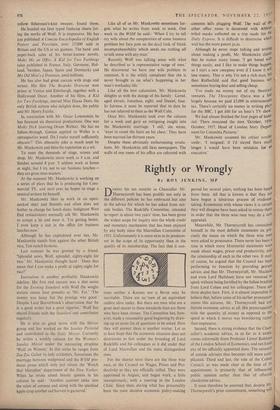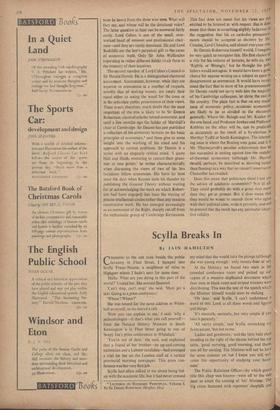Rightly or Wrongly
By ROY JENKINS, MP
DURING his ten months as Chancellor Mr. Thorneycroft has been prolific not only in the different policies he has embraced .but also in the advice for which he has asked from out- side bodies. The Radcliffe Committee, intended to report in about two years' time, has been given the widest scope for inquiry into the whole credit and monetary mechanism that has been enjoyed by any body since the Macmillan Committee of 1931. Unfortunately it is more akin to its predeces- sor in the scope of its opportunity than in the quality of its membership. The fact that it con- tains neither a Keynes nor a Bevin may be inevitable. There are no 'men of an equivalent calibre alive today. But there are men who are a great deal nearer to these standards than are those who have been chosen. The Committee has, how- ever, made a reasonably good beginning by draw- ing up an acute list of questions to be asked. How they will answer them is another matter. Let us at least hope that the economic situation does not deteriorate as fast under the brooding of Lord Radcliffe and his colleagues as it did under that of Lord Macmillan and his more distinguished ones.
For the shorter term there are the three wise men, or the Council on Wages, Prices and Pro- ductivity as the/ are officially called. They were appointed in August, and began work, a little inauspiciously, with a meeting in the London Clinic. Since then, during what has presumably been the most decisive economic policy-making period for several years, nothing has been heard from them. All that is known is that they too have begun a laborious process of evidence' taking. Economists with whose views it is certain they will disagree have been asked to restate then) in order that the three wise men may do a no' appraisal.
Meanwhile, Mr. Thorneycroft has committed himself to the most definite statements on pre' cisely the issues on which the three wise men were asked to pronounce. There never has been time in which more Ministerial statements were made about wages, prices and productivity, and the relationship of each to the other two. It ma7, of course, be argued that the Council has been performing its function by providing private advice, and that Mr. Thorneycroft, Mr. Macleod and even Lord Hailsham have not ventured to speak without being fortified by the fullest briefing from Lord Cohen and his colleagues. There are three doubts here. First, it is almost impossible to believe that, before some of his earlier pronounce- ments this autumn, Mr. Thorneycroft had anY' literate economic advice at all. His preoccupation with the quantity of money as opposed to the speed at which it moves was bewildering rather than impressive. .
Second, there is strong evidence that the Chan' cellor's academic advice, in so far as it exists, comes informally from Professor Lionel Robbins of the London School of Economics, and not from any of his officially appointed dons. The network of outside advisers thus becomes still more corn' plicated. Third and last, the role of the Cohen Council, as was made clear at the time of its appointment, is primarily that of influencing public opinion rather than that of offering clandestine advice.
It must therefore be assumed that, despite MI' Thorneycroft's prior commitment, something will soon be heard from the three wise men. What will they say, and whose will be the dominant voice? The latter question at least can be answered fairly easily. Lord Cohen is one of the small, over- worked band of eminent and professional chair- men—and they are rarely dominant. He and Lord Radcliffe are the law's perpetual gift to the cause of economic truth. Only Sir John Wolfenden (operating in rather different fields) rivals them in the intensity of their inquiries.
The second member of Lord Cohen's Council is Sir Harold Howitt. He is a distinguished chartered accountant. Accountants, however, while they are superior to economists in a number of respects, notably that of making money, are rarely their equal either in seeing the wood for the trees or in the articulate public presentation of their views. There is not, therefore, much doubt that the most important of the trio is likely to be Sir Dennis Robertson, classical scholar turned economist, and until a few months ago the holder of Marshall's chair at Cambridge. Sir Dennis has just published a collection of his university lectures on the basic principles of economics,* and these give us some insight into the working of his mind and his approach to current problems. Sir Dennis is a stylist with an elegantly critical mind. '1 quote Hall and Hitch, venturing to correct their gram- mar at two points,' he writes characteristically when discussing the views of two of his less fastidious fellow economists. His forte (at least since the days when Keynes stole his thunder by publishing the General Theory without waiting for or acknowledging the work on which Robert- son had been engaged) has been the tracing of precise intellectual circles rather than any massive constructive work. He has emerged increasingly as an economist of the Right, sharply cut off from the enthusiastic group of Cambridge Keynesians. This fact does not mean that his views are not entitled to be listened to with respect. But it does mean that there is something slightly ludicrous in the suggestion that his ex cathedra pronounce- ments should be accepted as decisive by Mr. Cousins, Lord Chandos, and almost everyone else.
Sir Dennis Robertson himself would, I imagine, be very quick to recognise this. His first choice of a title for his volume of lectures, he tells us, was 'Rightly or Wrongly,' but he thought his pub' lishers would not agree. It would have been a good choice for anyone writing on a subject as open 10 disagreement as economics. It would have recog- nised the fact that in most of his pronouncements Sir Dennis could not carry with him the majoritY of his Cambridge colleagues, let alone the rest of the country. The plain fact is that on any major issue of economic policy, academic economists are likely to be as divided as the electorate generally. Where Mr. Balogh and Mr. Kaldor on the one hand, and Professor Jewkes and Professor Robbins on the other will be, can be predicted as accurately as the result of a by-election in Merthyr Tydfil or South Kensington. The interest- ing issue is where the floating vote goes; and it i5 Mr. Thorneycroft's peculiar achievement that he has succeeded in uniting against him the middle' of-the-road economists (although Mr. Harrod should, perhaps, be described as shooting rather than floating) in a way that no recent Conservative Chancellor has rivalled.
Does this mean that politicians shout not use the advice of academic economists? Not at alt. They could probably do with a great deal more than they get at present. But it does mean that they would be wisest to consult those who agree with their political aims, to do it privately, and not to pretend that the result has any particular objet, tive validity.











































































 Previous page
Previous page